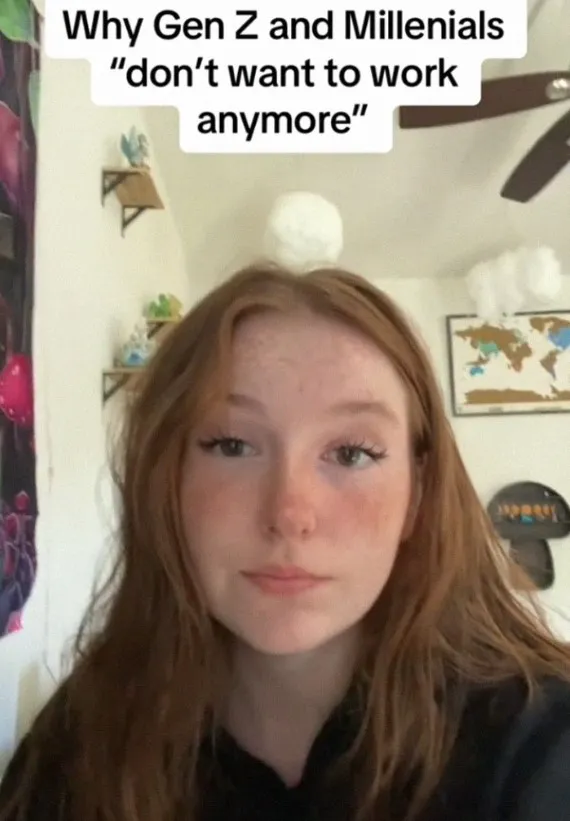A woman explains that younger generations no longer want to work due to low pay, poor balance, and lack of fulfillment.
In recent years, there has been a lot of discussion about why younger generations, particularly Millenials and Generation Z, seem less enthusiastic about traditional work.
Woman reveals reason younger generations no longer want to work
A viral TikTok video by a woman named Mik sheds light on this topic, explaining that the perception of laziness among these generations is often misguided.
Instead, she argues that the real issues lie in economic circumstances and societal expectations.

Mik starts by addressing the common stereotype that Millennials and Gen Z do not want to work.
Many people jump to the conclusion that these younger individuals are simply lazy or entitled.
However, Mik points out that this is not the case.
She emphasizes that most young people actually want to work; they want their efforts to be meaningful and rewarding.
For many, work provides a sense of purpose and structure in their lives.

“I do want to work. If I didn’t work, I honestly think I would probably get so bored that I would want to off myself. Most of us want to work.
It helps give you purpose, it helps give you something to do. Hopefully, you do something you’re passionate about.
Luckily for me, I do do something I’m passionate about. So I genuinely like my job,” she said in a viral video.
One of the major frustrations voiced by Mik and others in her generation is the rising cost of living.
According to her, wages have not kept pace with expenses. While costs for housing, education, and basic necessities have soared, salaries have increased only slightly.
This disparity makes it very difficult for young workers to afford a decent standard of living.
Mik notes that people in her generation often find themselves working multiple jobs just to make ends meet, yet they still struggle to pay rent and buy food.

“We’re working 40 to 60 hours a week, on average. And we cannot afford to live.
We just do not make enough to pay rent, to pay for food. Everything is so expensive right now. And wages are not keeping up with the cost of living.
So we are working full-time, giving up a huge portion of our lives to work, and we can’t even afford to live,” Mik added.
This situation leads to feelings of hopelessness and frustration.
When young people work hard for long hours but still cannot afford to live comfortably, they start to question the value of their labor.
Mik explains that many of her peers have completed their education, followed all the traditional paths to success, and still find themselves in debt.

This reality can be disheartening and contributes to a sense of disillusionment about the future.
“That is why my generation is frustrated. That is why we don’t want to work anymore.
Because we work really hard, and we still can’t afford to even get by,” Mik affirmed.
Furthermore, Mik indicates a generational divide in attitudes towards work.
Older generations often view work as a necessary obligation, a means to an end.
In contrast, younger generations are more inclined to seek a balance between work and personal life.
They want jobs that not only pay the bills but also align with their values and passions.

If a job does not provide this, they may choose to disengage or seek alternative paths.
“A lot of us have two or three jobs or work a full-time job and have several side hustles. That is the case for me.
And then older generations just look at us and they’re like, ‘You’re not working hard enough.
This is your fault. You’re not working hard enough,” Mik said.
Another critical point made by Mik is the impact of environmental concerns on young people’s outlook.
Many young individuals feel anxious about the future of the planet due to climate change and environmental degradation.
This uncertainty can lead to a sense of nihilism, making traditional work seem even less appealing.
Why hustle for a future that feels uncertain or bleak?

“And on top of all that, politicians and older generations are destroying our environment, not doing anything to protect it.
So we don’t even know that there’ll be a habitable earth when we’re older, to live in.
So yeah, that makes us pretty pessimistic and nihilistic and not want to work,” the woman said.
The reactions to Mik’s video have been mixed but revealing.
The reactions to Mik’s video have been mixed but revealing.
Many people from her generation relate to her message. They also face difficulties balancing work with financial stability in today’s tough economy.
Conversely, some older commenters criticize younger generations, labeling them as lazy or ungrateful.
I’ve been working since I was 17 I’m 37 I have nothing to show for it aside from still being alive, one user wrote.
we want to contribute, but we don’t want to be exploited – huge difference, the second user commented.
We are 5x as productive as the boomer generation (not just bc of tech) and we are paid 1/5 for things that keep rising, the third user said.
and millennials are in our 30s and 40s with lifestyles still not dissimilar to our 20s. I saw my parents succeed with factory jobs, another wrote.
Why would I want to work with no goal in sight that I can reach, someone said.